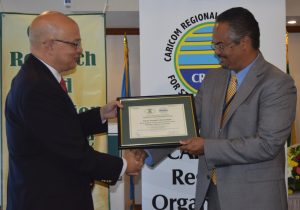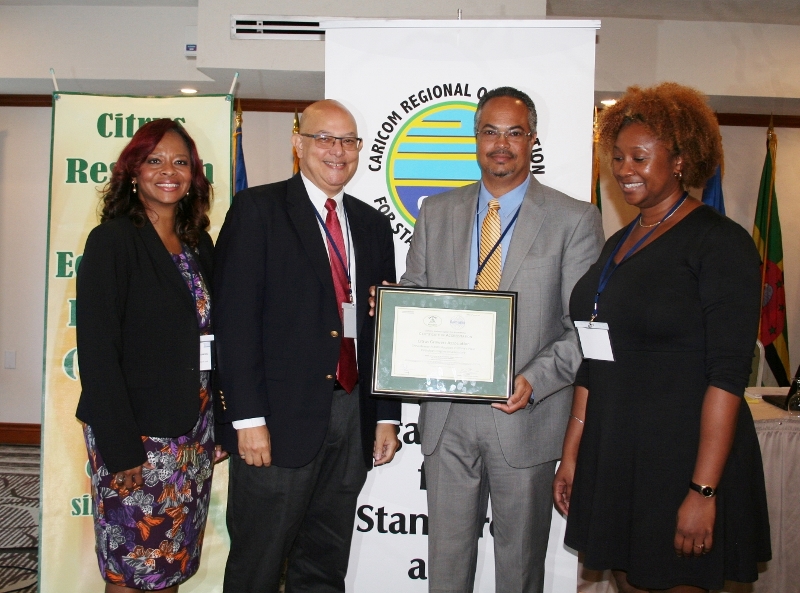The CARICOM Region now has its first accredited citrus plant pathology laboratory, located in Belize.
The Belize Citrus Growers Association’s (CGA) was awarded the ISO/IEC 17025 accreditation certificate by the Jamaica National Agency for Accreditation (JANAAC) at the 32nd Meeting of the Council of the CARICOM Regional Organisation for Standards and Quality (CROSQ) held in Barbados recently.
The CGA’s Chief Executive Officer, Mr. Henry Anderson noted that this accreditation was proof that the laboratory was competent to perform tests to the “General Requirements for the Competence of Testing and Calibration Laboratories” ISO / IEC 17025 Standard.
“Continuous analysis of the regional and global marketplace led us to the realization that we were competing not in a traditional citrus industry but in a juice industry. While we must redouble our efforts to expand our citrus production, we must do so while complementing our citrus production with the production of other fruit varieties and vegetables that can be processed to formulate the juice blends that are now being demanded by the regional and global marketplace,” he said.
To do this, he noted that the association set out to achieve management system certification of its Plant World Nursery with assistance from the Caribbean Development Bank (CDB), which should happen by the end of this year; accreditation of its laboratories operated by the association’s research arm, the Citrus Research and Education Institute (CREI); improvement of its commercial services and scaling up operations within its production and processing company. All these elements, he maintained, would strengthen the overall citrus value chain operated by CGA.
“Our vision was in the first instance to improve customer service and then to attract resources to get ISO/IEC 17025 accreditation for the lab and ISO 9001:2015 certification for Plant World Nursery. These would be leveraged to submit a proposal and get exclusive access to two patented HLB Valencia citrus varieties that were being released in Florida.”

The CDB has played a crucial role in financing the technical assistance to get the laboratory and nursery towards certification and then accreditation status. CROSQ provided the technical assistance for the accreditation through its Caribbean Cooperation for Accreditation (CCA) Scheme. In this case, JANAAC was the accreditation body that conducted the assessments to verify the lab’s conformance to the standard.
The CEO also praised his team for their commitment. “We have a very small team, but they set sail down the river of uncertainty and worked seven days per week, twelve to fifteen hours per day to get accredited for five test methods – HLB, Citrus Psorosis, Citrus Tristeza, pH water and pH soil. All tests that are critical to the production of citrus nursery plants that must comply with the Belize Agricultural Health Authority’s Belize Citrus Certification Program regulations.
“CDB relied on CROSQ to provide technical oversight for the project and both organizations allowed us to synchronize the work of their respective consultants – Mrs. Maxine Campbell for CROSQ project and Dr. Raymond Reid for CDB project. This collaboration by two regional organizations is a model to be replicated,” stated Mr. Anderson.
Coordinator, Regional Cooperation and Integration in the Regional Cooperation Division of the CDB, Ms. Andrea Power stated: “CDB’s support for the accreditation of the CGA Lab both through the EU EPA Standby Facility and the CDB’s Caribbean Technological Consultancy Services (CTCS) is part of an overall effort by the Bank to support regional cooperation and integration in general and to facilitate increased intra-regional trade in particular. The Bank remains committed to supporting enhanced quality infrastructure so that more regionally produced goods can meet market access requirements.”
CROSQ’s CEO, Mr. Deryck Omar, who praised all the partners involved said it was a proud moment for the organisation and the collaborative mechanisms within the CARICOM Region which saw this accreditation come to pass.
“When the CROSQ Caribbean Cooperation for Accreditation (CCA) Scheme was established, it was envisioned as a way to not only bring the cost of accreditation down across the region, but as a way to pool our knowledge and skills as a region, so those with the expertise could assist, through a cooperative arrangement, those who needed support to accreditation and did not have all the requisite resources. Since the scheme started under the 10th EDF-TBT (European Development Fund-Technical Barriers to Trade) Programme, we’ve seen more and more labs being accredited under the CCA.
“All this also comes together because of donor agencies who are willing to also put their contributions behind the process, and that’s where organisations like the Caribbean Development Bank, the UK Department for International Development (DFID), the European Union (EU) and others, who have played a part, because it is a serious financial undertaking when labs decide to take this step toward accreditation. The wonderful thing about it though is that we have been proving throughout the CARICOM chain that the benefits are worth it, for the lives, health and safety of our Caribbean populations.”





